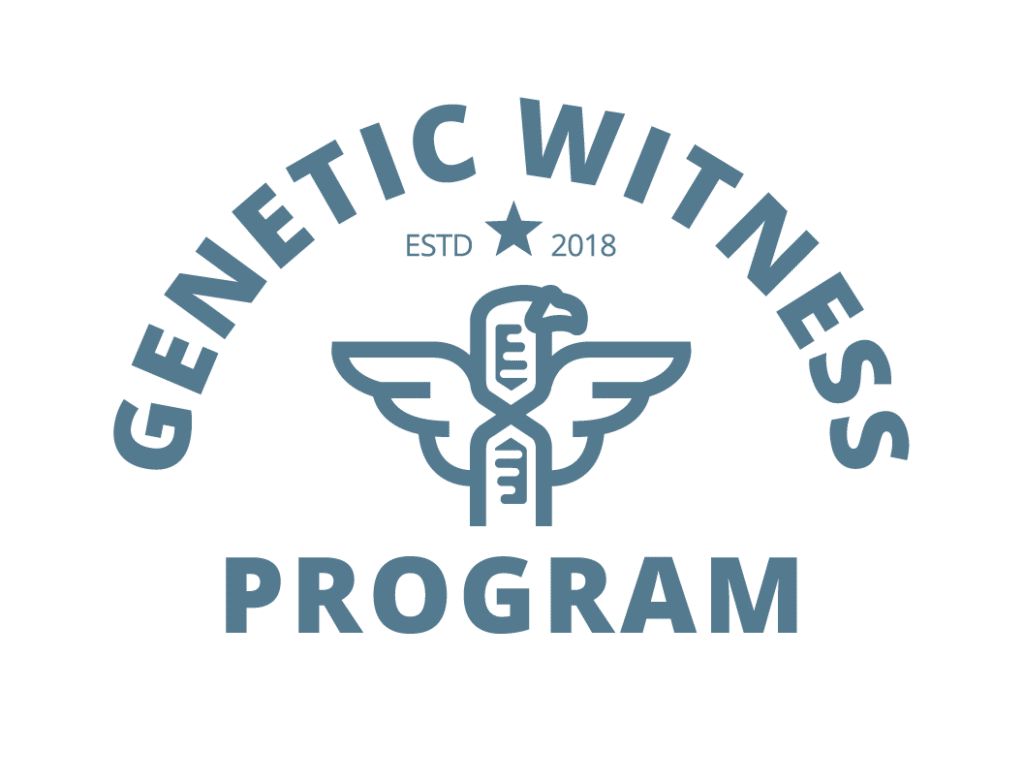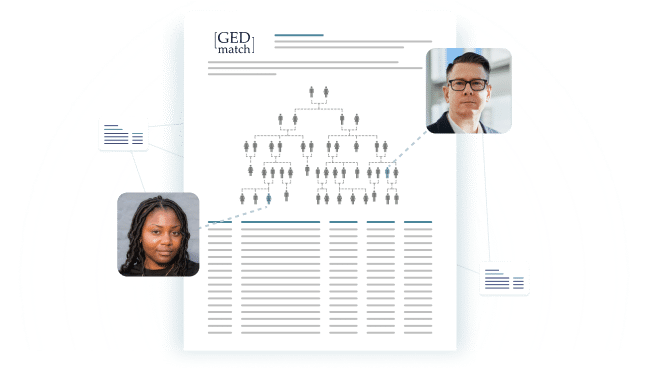FAQs About Opting In
By uploading your genealogical data to GEDmatch you can empower law enforcement to provide answers to those with missing loved ones. You can also choose to opt in and enable law enforcement to solve violent crimes and exonerate the falsely accused. GEDmatch has already contributed to the successful resolution of more than 1000 investigations thanks to the generosity of those who have voluntarily uploaded their genealogical data and have consented to their data being included in law enforcement comparisons.
Traditional eyewitness testimony has long been an important part of law enforcement investigations and now your DNA can help too. DNA can act as a molecular eyewitness, providing the approximate age, hair color, eye color, or skin tone of a person of interest. DNA also helps identify people through distant family connections. In a process known as genetic genealogy, family trees can be constructed from sections of DNA passed down from generation to generation.
Genetic genealogy has allowed families to connect, adoptees to identify birth parents, and foundlings to discover their identities. Now it is being used by investigators to make identifications when all other methods have failed.
While genetic genealogy gained notoriety for resolving high-profile criminal cases, its impact is much wider than headlines suggest. DNA can shine a light on miscarriages of justice, freeing those who are wrongly imprisoned. It can also give a name to unidentified remains, bringing closure to families wondering what happened to their missing loved ones. Currently, there are more than 14,000 unidentified bodies in the US alone.1 Each one of them is related to someone, and each one of them is waiting for their name to be restored.
No, law enforcement does not get to see your raw DNA data when you consent to allow your data to be included in those types of searches. Just like any other user of GEDmatch, law enforcement can only see your name or GEDmatch alias, email address, and how much DNA you share with the law enforcement profile. Law enforcement uses a purpose-built website called GEDmatch PRO where they upload the investigative profile and let the GEDmatch support the generation of leads or identification of genetic relatives.
When sharing any information with law enforcement, there are risks to consider before deciding to opt in. For example, you might learn things about yourself or your family that are difficult to hear. There is the possibility that your relatives may be contacted if their DNA could help guide investigators to the correct part of a family tree. The question on whether to opt in is ultimately a personal one: Does the opportunity to resolve investigations and help other families outweigh the potential risks?
GEDmatch provides four categories of privacy options when you upload your DNA kit. Once uploaded, you can easily change from one category or another when you wish.
Privacy Category | What does it mean ? |
Private | Your kit is not available for comparisons with any other kits. No comparison results will be shown unless you change this setting to another privacy category. |
Research | We will compare your DNA kit to all other kits in the GEDmatch database to find your matching genetic relatives. However, your DNA kits will not be shown in match result reports generated for other kits (including kits submitted by or on behalf of law enforcement). Genealogy and genetic genealogy require the sharing of information, and choosing this option will not allow your matches to see your DNA kit in their match results. This option may be used for regular uploads if you have specific reasons for doing so. |
Public + Opt-Out | We will compare your DNA kit to all other kits in the GEDmatch database to find your matching genetic relatives. Kits in the database include those submitted by users undertaking personal genetic genealogy research, adoptee searches, and users (including law enforcement) attempting to identify unidentified human remains. Your kit WILL NOT be compared with kits submitted by law enforcement to identify perpetrators of violent crimes. |
Public + Opt-In | We will compare your DNA kit to all other kits in the GEDmatch database to find your matching genetic relatives. Kits in the database include those submitted by users undertaking personal genetic genealogy research, adoptee searches, users (including law enforcement) attempting to identify unidentified human remains, and law enforcement attempting to identify perpetrators of violent crimes. Your kit WILL be compared with kits submitted by law enforcement to identify perpetrators of violent crimes. The operators of GEDmatch encourage everybody to select this option. |





